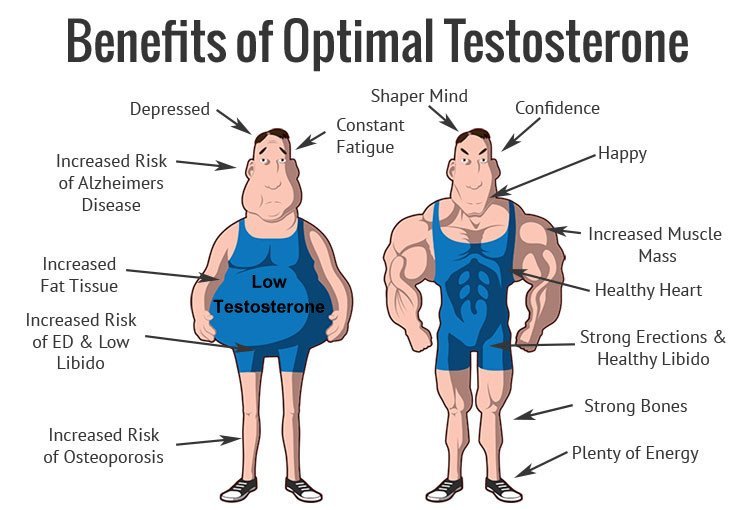Benefits of Testosterone Replacement Therapy
Testosterone replacement therapy (TRT) is a medical treatment that aims to restore testosterone levels in individuals who have low levels of this hormone. It can provide numerous benefits and improve overall well-being. In this article, we will explore the various advantages of testosterone replacement therapy and its potential impact on individuals.
Increased Energy and Stamina
One of the primary benefits of testosterone replacement therapy is the increase in energy levels and stamina. Testosterone plays a crucial role in maintaining energy and vitality, and when levels are low, individuals may experience fatigue and a lack of motivation. TRT can help combat these symptoms, leading to increased energy, improved productivity, and enhanced overall performance.
Enhanced Muscle Mass and Strength
Testosterone is closely linked to muscle growth and development. Low testosterone levels can result in decreased muscle mass and strength, making it challenging to achieve fitness goals. Through testosterone replacement therapy, individuals can experience an increase in muscle mass, improved muscle strength, and enhanced physical performance. This can be particularly beneficial for individuals involved in strength training or athletes looking to optimize their performance.
Improved Bone Density
Another significant benefit of testosterone replacement therapy is its positive impact on bone health. Testosterone plays a crucial role in maintaining bone density and strength. With age, testosterone levels naturally decline, which can lead to a decrease in bone density and an increased risk of osteoporosis. TRT can help prevent bone loss, improve bone density, and reduce the risk of fractures, ultimately promoting better overall bone health.
Enhanced Libido and Sexual Function
Testosterone is a key hormone involved in sexual function and libido. Low testosterone levels can lead to a decrease in sex drive, erectile dysfunction, and other sexual problems. Testosterone replacement therapy can help restore healthy testosterone levels, leading to an improvement in libido, increased sexual desire, and enhanced sexual performance. It can have a positive impact on the overall quality of intimate relationships.
Improved Mood and Cognitive Function
Testosterone plays a vital role in maintaining mental well-being and cognitive function. Low testosterone levels have been associated with mood swings, irritability, and difficulties with concentration and memory. Testosterone replacement therapy can help alleviate these symptoms, leading to improved mood stability, enhanced cognitive function, and better overall mental clarity.
Reduced Risk of Heart Disease
Studies have shown that testosterone replacement therapy may have a positive impact on cardiovascular health. Low testosterone levels have been associated with an increased risk of heart disease, including conditions such as coronary artery disease. By restoring testosterone levels, TRT may help reduce the risk of heart disease, improve cardiovascular function, and promote a healthier heart.

Testosterone replacement therapy offers a range of benefits for individuals with low testosterone levels. From increased energy and stamina to enhanced muscle mass and strength, improved bone density, and better sexual function, TRT can significantly improve overall well-being. It is essential to consult with a qualified healthcare professional to determine if testosterone replacement therapy is suitable for you and to ensure proper monitoring throughout the treatment process.
Frequently Asked Questions
1. What is testosterone replacement therapy?
Testosterone replacement therapy is a medical treatment that involves supplementing or replacing the testosterone hormone in individuals who have low levels. It can be administered through various methods such as gels, patches, injections, or pellets.
2. Who can benefit from testosterone replacement therapy?
Testosterone replacement therapy is typically recommended for men who have been diagnosed with low testosterone levels (hypogonadism). However, it may also be considered for women with low testosterone levels due to certain medical conditions.
3. What are the potential benefits of testosterone replacement therapy?
The benefits of testosterone replacement therapy may include increased energy levels, improved mood and mental clarity, increased muscle mass and strength, enhanced sexual function and libido, and improved bone density.
4. How long does it take to see the effects of testosterone replacement therapy?
The timeframe for experiencing the effects of testosterone replacement therapy can vary from person to person. Some individuals may notice improvements in symptoms within a few weeks, while others may require several months of treatment.
5. Are there any risks or side effects associated with testosterone replacement therapy?
Like any medical treatment, testosterone replacement therapy carries potential risks and side effects. These may include acne, fluid retention, increased red blood cell count, sleep apnea, breast enlargement, and prostate enlargement. It is important to discuss these risks with your healthcare provider.
6. Can testosterone replacement therapy help with weight loss?
Testosterone replacement therapy may help with weight loss to some extent. It can increase muscle mass and metabolic rate, which can contribute to a higher calorie burn. However, it is not a standalone solution for weight loss and should be combined with a healthy diet and regular exercise.
7. Is testosterone replacement therapy only for older individuals?
No, testosterone replacement therapy is not exclusively for older individuals. While testosterone levels naturally decline with age, younger individuals with low testosterone levels due to medical conditions or other factors may also benefit from this therapy.
8. Can testosterone replacement therapy improve fertility?
Testosterone replacement therapy is not suitable for improving fertility. It can suppress sperm production and reduce fertility. If fertility is a concern, alternative treatments should be considered.
9. Is testosterone replacement therapy covered by insurance?
Insurance coverage for testosterone replacement therapy can vary depending on your insurance provider and policy. It is advisable to contact your insurance company directly to understand the coverage and any associated requirements.
10. How long do I need to continue testosterone replacement therapy?
The duration of testosterone replacement therapy will depend on your specific situation and the underlying cause of low testosterone. Some individuals may require long-term therapy, while others may see improvements and eventually discontinue treatment. Regular monitoring and discussions with your healthcare provider are essential.




